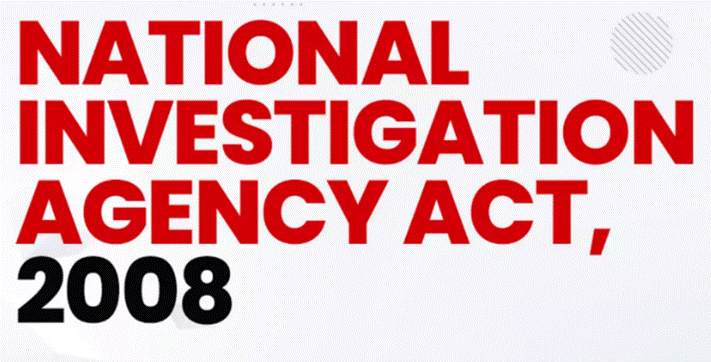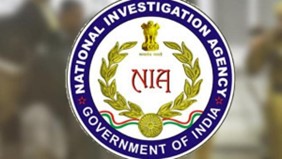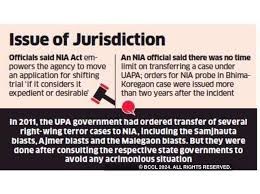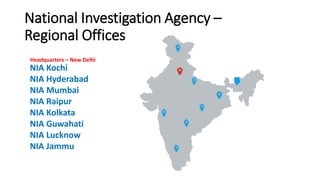PREVIOUS
National Investigation Agency Act, 2008 - Part 01
May 25 , 2024
336 days
1190
0
(இதன் தமிழ் வடிவத்திற்கு இங்கே சொடுக்கவும்)
National Investigation Agency Act, 2008
- The NIA's jurisdiction applies nationwide, encompassing citizens of India residing abroad, as well as government personnel worldwide.
- It extends to individuals on ships and aircraft registered in India.
- Additionally, it covers persons committing scheduled offences beyond India's borders against Indian citizens.
- It also covers persons committing scheduled offences against Indian interests.

Objective:
- The Act's primary objective is to establish a national-level investigative body.
- It focuses on probing and prosecuting offences endangering India's sovereignty, security, and integrity.
- It targets offences involving threats to state security.
- It also targets offences involving threats to friendly foreign relations.
- It addresses violations of Acts implementing international treaties and conventions.
- The Act's scope extends to resolutions of global bodies like the United Nations.
- Its mandate covers crimes with potential international ramifications.
- The agency aims to combat a wide range of transnational threats.
- Its jurisdiction spans across various aspects of national and international law.

Constitution of National Investigation Agency:
Establishment of Agency:
- The Central Government is empowered to establish a specialized agency known as the National Investigation Agency (NIA).
- This agency is tasked with investigating and prosecuting offences listed in the Schedule of the Act.

Powers of NIA Officers:
- NIA officers possess the same powers, duties, privileges, and liabilities as police officers, irrespective of their location within India or abroad.
- They are authorized to investigate scheduled offences and arrest individuals involved in such offences.
- Officers of the NIA, ranked Sub Inspector or above, are granted authority equivalent to that of a police station officer in charge.
- They can exercise these powers throughout India as directed by the Central Government.

Superintendence of National Investigation Agency:
- The National Investigation Agency (NIA) operates under the superintendence of the Central Government (Ministry of Home Affairs).
- This means that the Central Government has the ultimate authority and control over the agency's activities and functions.
Constitution and Service Conditions:
- The formation of the NIA and the terms of service for its members are determined in accordance with the provisions outlined in this Act.
- This agency is established in a manner specified by law, and the conditions of employment for individuals working within the NIA are also prescribed by the Act.
Investigation of Scheduled Offences:
- When a police station receives information about a Scheduled Offence, they must quickly pass on the report to the State Government.
- The State Government then promptly forwards this report to the Central Government.
- Within fifteen days of receiving the report, the Central Government assesses if the offence qualifies as a Scheduled Offence.
- It determines the need for NIA investigation based on the available information.
- The Central Government makes its decision promptly upon receiving the report.
- The assessment considers various factors, including the nature and gravity of the offence.
- Available information guides the Central Government's determination.
- The decision hinges on whether the offence warrants NIA involvement.
- The timeframe for the decision is set at fifteen days for prompt action.
- The Central Government evaluates the necessity of NIA intervention in the case.
- If it's a Scheduled Offence fit for NIA investigation, the Central Government directs the Agency to start the investigation.
- The Central Government can also instruct the NIA to investigate a Scheduled Offence if it deems necessary, regardless of the State's report.
- Once the NIA is directed to investigate, the State authorities conducting the investigation must stop and transfer all relevant documents to the NIA.
- Until the NIA officially takes over, the police station's officer-in-charge continues the investigation.
- If a Scheduled Offence happens outside India but falls under this Act, the Central Government can tell the NIA to investigate, treating it as if it occurred in India.
- For this, the Special Court in New Delhi has jurisdiction.
Power to Transfer Investigation to State Government:
- The Agency, while investigating an offence under this Act, possesses authority.
- It can request collaboration with the State Government if necessary.
- Collaboration may be sought based on the gravity of the offence and other relevant factors.
- Alternatively, with prior approval from the Central Government, the Agency can transfer the case to the State Government for investigation and trial.
- The decision to collaborate or transfer the case depends on the severity of the offence and other pertinent factors.
- The Agency's actions aim to ensure effective investigation and trial of the offence.
- Collaboration with the State Government may enhance investigative efforts.
- Transferring the case to the State Government requires prior approval from the Central Government.
- Both options serve the objective of thorough investigation and fair trial.
Power to Investigate Connected Offences:
- During the investigation of a Scheduled Offence, the Agency has the authority to probe additional offences linked to the accused.
- This authority allows the Agency to broaden its investigation scope if it finds connections to the Scheduled Offence.
- Investigating connected offences improves the thoroughness and effectiveness of the investigation.
State Government Assistance to National Investigation Agency:
- The State Government is obligated to provide full assistance and cooperation to the Agency in its investigation of Scheduled Offences.
Power of State Government for Investigation:
- State Government can still investigate and prosecute Scheduled Offences and other crimes as usual, unless stated otherwise in this Act.
Power of Central Government to Establish Special Courts:
- The Central Government, after consulting the Chief Justice of the High Court, can assign one or more Courts of Session as Special Courts to handle Scheduled Offence trials.
- These designations are officially announced in the Official Gazette, specifying the areas or cases for their jurisdiction.
Place of Sitting:
- A Special Court has the authority to convene its proceedings at any location other than its regular venue.
- This decision can be made either autonomously by the court or upon request by the Public Prosecutor.
- The purpose is to accommodate circumstances where an alternative venue is deemed necessary or beneficial.
Jurisdiction of Special Courts:

- Scheduled Offences investigated by the Agency must be tried exclusively by the Special Court within the jurisdiction where the offence occurred.
- This jurisdictional mandate supersedes any provisions outlined in the legal Code.
- The Supreme Court or the High Court can transfer cases between Special Courts under certain circumstances.
- Such circumstances include situations where a fair trial is jeopardized, or there are concerns regarding the safety of involved parties.
- Applications for transfers must be supported by a sworn statement, often initiated by the Central Government or a concerned party.
Powers of Special Courts Regarding Other Offences:
- A Special Court has the authority to adjudicate on multiple offences concurrently if they are interconnected.
- In a trial under this Act, if the accused commits another offense, the Special Court can deliver judgment.
- Appropriate penalties can be imposed by the Special Court if another offense is discovered during the trial.
- The Special Court has the authority to address additional offenses committed by the accused during the trial.
Public Prosecutors:
- The Central Government is responsible for appointing a Public Prosecutor and may appoint one or more Additional Public Prosecutors.
- In certain cases, a Special Public Prosecutor may be appointed for specific cases or categories.
- To be eligible for appointment, candidates must have at least seven years of legal practice as an Advocate or in a specialized legal role within the Union or a State.
- Once appointed, individuals take on the role of Public Prosecutor as outlined in the legal Code, carrying the associated duties and privileges.
- Their responsibilities mirror those of Public Prosecutors, representing the state in legal proceedings.
- They have the corresponding authority to uphold the state's interests in legal matters.
- This ensures that appointed individuals have the requisite experience and understanding of legal matters to fulfil their role effectively.
Procedure and Powers of Special Courts:
- A Special Court can start proceedings for any offense with a complaint or police report without the accused being formally committed for trial.
- For offenses punishable with up to three years' imprisonment or a fine, the Special Court can hold a summary trial following legal Code procedures.
- If a summary trial isn't suitable, the Special Court can switch to a regular trial, recalling witnesses and following standard procedures.
- Special Courts have the same powers as Courts of Session and conduct trials accordingly, with adaptations from the legal Code.
- Cases moved to Special Courts are treated like transfers under regular legal provisions.
- Despite general norms, Special Courts may proceed with trials in the absence of the accused or their representative, with recorded reasons.
Leave a Reply
Your Comment is awaiting moderation.


